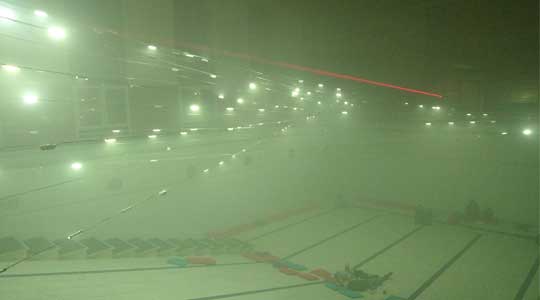n_polytope
Behaviors in Light and Sound After Iannis Xenakis

"n_polytope: Behaviours in Light and Sound After Iannis Xenakis" is a spectacular light, sound, and architectural environment. The performance-installation by Chris Salter, in collaboration with Sofian Audry, Marije Baalman, Adam Basanta, Elio Bidinost, and Thomas Spier combines cutting-edge lighting, lasers, sound, and sensory and artificial intelligence software technologies inspired by composer Iannis Xenakis’ radical 1960s-1970s works, "Polytopes" (from the Greek poly, many and topos, space).
Xenakis pioneered the use of mathematical models in music and is commonly recognized as one of the most important post-war avant-garde composers. His original "Polytopes", large scale, immersive environments, were created far ahead of their time and remain relatively unknown. Chris Salter's installation attempts to both re-imagine Xenakis' work with new techniques, and to explore how these techniques resonate with our own historical moment of extreme instability in natural and artificial systems.
"n_polytope" runs as both a 25-minute performance and as a continuously evolving installation. It is steered through a sensor network that utilizes cutting-edge machine learning algorithms that adapt different rhythmic and temporal patterns produced by the light and sound, generating a totalizing, visceral, self-organizing composition. 150 10-Watt LEDs and numerous tiny speakers are suspended through the space, producing bursting points of light. Colored lasers bounce off the surface of fixed and changing mirrors to suggest fleeting architectures of lines and shapes, and multi-channel audio, shifting between sparse natural and dense electronic textures, fills the space. Thus is created a walk-through performance environment that swings continually between order and disorder.
Salter's n_polytope installation allows the audience to immerse themselves within its sound and light environment, thus "feeling" the algorithms as two forms of "life" – that of the movement of light and sound, as well as the "life" of experiencing such a system evolving in the present.
The presentation of n-polytope at CTM 2014 is supported by the Embassy of Canada, and the Quebec Government Office in Berlin. Special thanks also to David Sommer.
The work's ongoing production is supported by LABoral, LabXmodal (Montréal, CA), FCC (Fomento de Construcciones Contratas), Fonds de recherche du Québec: Société et culture (FQRSC, Canada); Hexagram Concordia (Montréal, CA); Schlaich Bergermann & Partner (Germany), and STEIM.
Facts
Opening Times
Opening: Sunday 26.1.14
Runs: Sunday 26.1. - Sunday 23.2.14 | Stattbad
Hours: 17h - 21h


